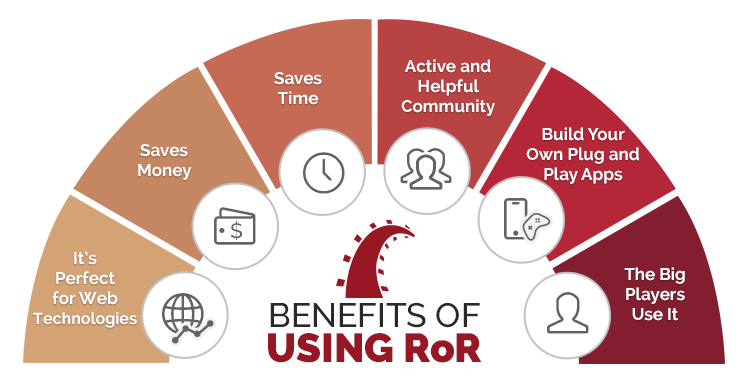Tech Versum: Explore the Future of Technology
Dive into the latest trends and innovations in technology with Tech Versum.
Ruby on Rails: The Framework That Makes Coding Feel Like a Breeze
Discover how Ruby on Rails transforms coding into a fun and effortless experience! Unleash your creativity with this powerful framework today!
10 Reasons Why Ruby on Rails is the Best Choice for Web Development
Ruby on Rails is renowned for its simplicity and efficiency, making it an excellent choice for web development. One of the most compelling reasons is its convention over configuration philosophy, which means developers can avoid unnecessary decision-making and focus on writing code. This approach accelerates the development process significantly, allowing teams to bring products to market faster. Additionally, Rails emphasizes the principles of DRY (Don't Repeat Yourself) and RESTful application design, which promotes cleaner and more maintainable code.
Another major advantage of Ruby on Rails is its rich library of pre-existing gems, which are reusable modules that extend the functionality of applications without having to reinvent the wheel. This ecosystem allows developers to seamlessly integrate features like authentication, file uploading, and payment processing into their projects. Moreover, the robust community support surrounding Rails ensures that developers can easily find solutions to common problems, access a wealth of tutorials, and benefit from regular updates. In a world where speed and efficiency are critical, these reasons make Ruby on Rails a standout choice for web development.

A Beginner's Guide to Understanding Ruby on Rails: Key Concepts Explained
Ruby on Rails, often referred to as Rails, is a powerful web application framework designed to make programming web applications easier and faster. As a beginner, the concept of convention over configuration is central to understanding how Rails operates. This means that Rails makes assumptions about what every developer needs to get started, allowing you to write less code and skip unnecessary configuration steps. In addition, the Model-View-Controller (MVC) architecture is fundamental to Rails. It separates your application into three interconnected components: Models handle the data, Views manage the user interface, and Controllers define the application's behavior by responding to user input and interacting with the Models.
Another key concept in Ruby on Rails is the use of RESTful routes, which allow developers to easily set up URLs that correspond to actions in their controller, facilitating smooth communication between the front-end and back-end. Understanding the Gem system is also crucial, as it provides a way to extend the functionality of your Rails application by adding libraries and tools created by other developers. As you delve deeper into Rails, you'll encounter the importance of Active Record, an Object-Relational Mapping (ORM) system that simplifies database interactions. By grasping these fundamental concepts, you'll be well on your way to becoming proficient in Ruby on Rails and building robust web applications.
How Ruby on Rails Simplifies the MVC Architecture for Developers
Ruby on Rails is a powerful web application framework that significantly simplifies the Model-View-Controller (MVC) architecture for developers. By providing a convention-over-configuration approach, Rails allows developers to focus on coding rather than on the complexities of the structure. This means that developers can set up the MVC components with minimal configuration, resulting in a more efficient development process. With its built-in tools like scaffolding and migrations, Ruby on Rails streamlines tasks that would otherwise be time-consuming, thus enhancing productivity and enabling developers to prototype their applications quickly.
One of the key advantages of using Ruby on Rails in the context of MVC is its emphasis on code organization and separation of concerns. In this architecture, the Model handles data and business logic, the View is responsible for the user interface, and the Controller acts as an intermediary between the model and the view. This clear separation allows developers to easily manage and collaborate on code. Additionally, Rails provides numerous built-in helpers and libraries that further facilitate the implementation of MVC, making it accessible even for those new to web development.